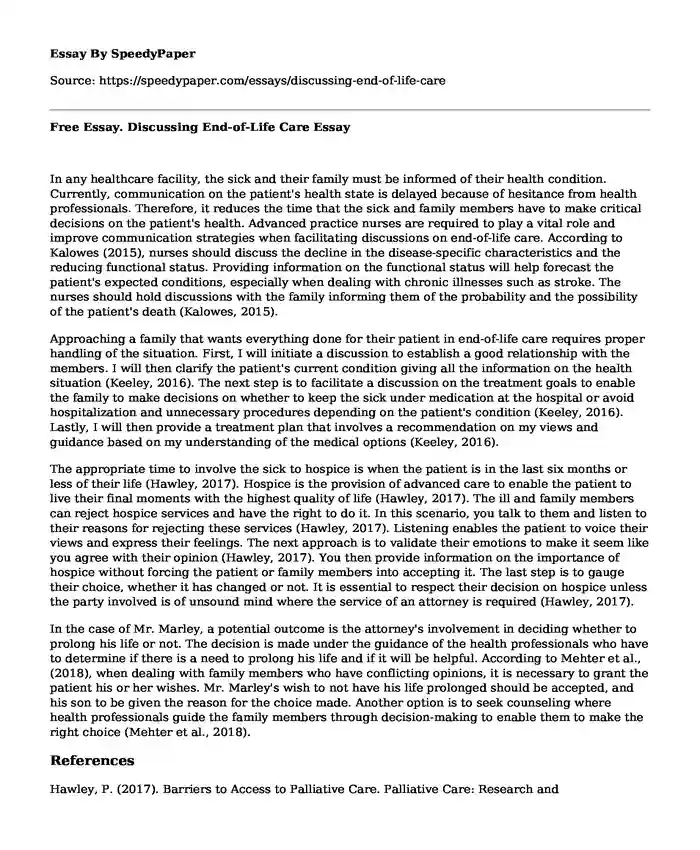
| Essay type: | Process essays |
| Categories: | Psychology Nursing Ethics Human services |
| Pages: | 3 |
| Wordcount: | 664 words |
In any healthcare facility, the sick and their family must be informed of their health condition. Currently, communication on the patient's health state is delayed because of hesitance from health professionals. Therefore, it reduces the time that the sick and family members have to make critical decisions on the patient's health. Advanced practice nurses are required to play a vital role and improve communication strategies when facilitating discussions on end-of-life care. According to Kalowes (2015), nurses should discuss the decline in the disease-specific characteristics and the reducing functional status. Providing information on the functional status will help forecast the patient's expected conditions, especially when dealing with chronic illnesses such as stroke. The nurses should hold discussions with the family informing them of the probability and the possibility of the patient's death (Kalowes, 2015).
Approaching a family that wants everything done for their patient in end-of-life care requires proper handling of the situation. First, I will initiate a discussion to establish a good relationship with the members. I will then clarify the patient's current condition giving all the information on the health situation (Keeley, 2016). The next step is to facilitate a discussion on the treatment goals to enable the family to make decisions on whether to keep the sick under medication at the hospital or avoid hospitalization and unnecessary procedures depending on the patient's condition (Keeley, 2016). Lastly, I will then provide a treatment plan that involves a recommendation on my views and guidance based on my understanding of the medical options (Keeley, 2016).
The appropriate time to involve the sick to hospice is when the patient is in the last six months or less of their life (Hawley, 2017). Hospice is the provision of advanced care to enable the patient to live their final moments with the highest quality of life (Hawley, 2017). The ill and family members can reject hospice services and have the right to do it. In this scenario, you talk to them and listen to their reasons for rejecting these services (Hawley, 2017). Listening enables the patient to voice their views and express their feelings. The next approach is to validate their emotions to make it seem like you agree with their opinion (Hawley, 2017). You then provide information on the importance of hospice without forcing the patient or family members into accepting it. The last step is to gauge their choice, whether it has changed or not. It is essential to respect their decision on hospice unless the party involved is of unsound mind where the service of an attorney is required (Hawley, 2017).
In the case of Mr. Marley, a potential outcome is the attorney's involvement in deciding whether to prolong his life or not. The decision is made under the guidance of the health professionals who have to determine if there is a need to prolong his life and if it will be helpful. According to Mehter et al., (2018), when dealing with family members who have conflicting opinions, it is necessary to grant the patient his or her wishes. Mr. Marley's wish to not have his life prolonged should be accepted, and his son to be given the reason for the choice made. Another option is to seek counseling where health professionals guide the family members through decision-making to enable them to make the right choice (Mehter et al., 2018).
References
Hawley, P. (2017). Barriers to Access to Palliative Care. Palliative Care: Research and Treatment, 10, 1178224216688887
https://www.ncbi.nlm.nih.gov/pmc/articles/PMC5398324/Kalowes, P. (2015). Improving End-of-Life Care Prognostic Discussions: Role of Advanced Practice Nurses. AACN Advanced Critical Care, 26(2), 151-166.
https://pubmed.ncbi.nlm.nih.gov/25898883/Keeley, P. (2016). Family Communication at the end of Life. Journal of Family Communication, 16(3), 189-197.
https://www.tandfonline.com/doi/abs/10.1080/15267431.2016.1181070?src=recsys&journalCode=hjfc20
Mehter, M., McCannon, B., Clark, A., & Wiener, S. (2018). Physician Approaches to Conflict with Families Surrounding End-of-Life Decision-Making in the Intensive Care Unit. A Qualitative Study. Annals of the American Thoracic Society, 15(2), 241-249.
https://eldercarealliance.org/blog/avoid-family-conflict-during-end-of-life-decisions/
Cite this page
Free Essay. Discussing End-of-Life Care. (2023, Nov 12). Retrieved from https://speedypaper.net/essays/discussing-end-of-life-care
Request Removal
If you are the original author of this essay and no longer wish to have it published on the SpeedyPaper website, please click below to request its removal:
- Health Status Essay Example
- Human Nutrition Paper Sample
- Interview Report: Discrimination on People Living With HIV/AIDS
- Paper Example. Support Groups for Survivors of Suicide
- Essay Example: The Potential Abuses of Computer Technology
- Essay Example. The Plan After the Lockdown
- Mental Illness: Causes, Challenges & Effects in Australia & Beyond - Paper Example
Popular categories




